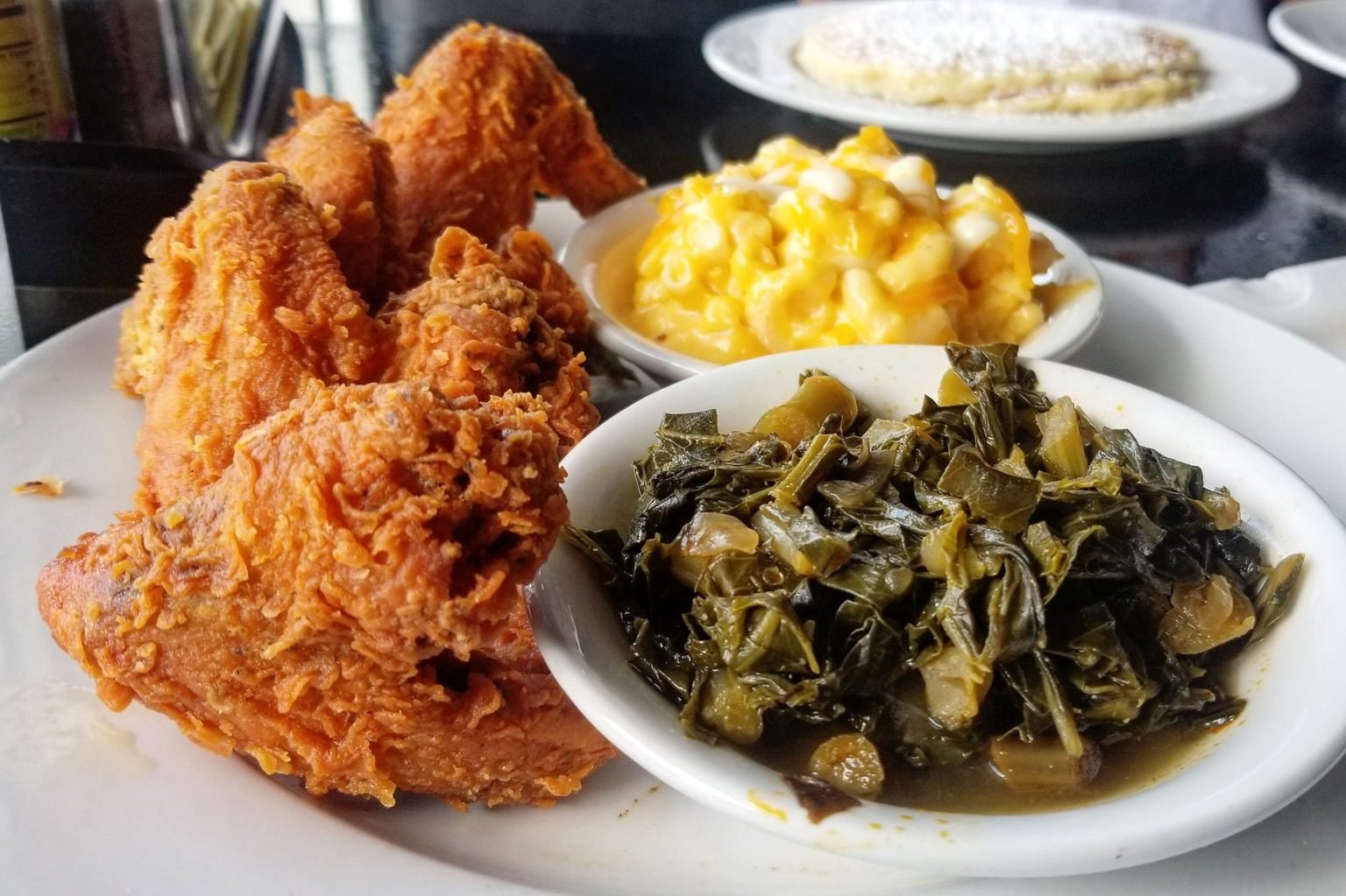What Exactly is Soul Food?
Soul food represents a cuisine that finds its roots deeply embedded in the African American community within the southern United States. Characterized by its generous use of ingredients such as pork, chicken, black-eyed peas, collard greens, and cornbread, this culinary tradition is known for its robust flavors and hearty servings. These dishes have historically played a central role in family gatherings and special celebrations, making them an integral part of social traditions.
The significance of soul food transcends its role as a mere culinary tradition. It serves as a powerful cultural symbol, deeply intertwined with the history and identity of the African American community. Passed down through generations, these dishes carry stories and memories that resonate with many African Americans, making them an indispensable part of their heritage.
Read also:Exploring Listcrawler Understanding Its Operations Legalities And Impact
Over the years, soul food has gained widespread popularity, appealing to diverse audiences beyond its original community. Today, numerous restaurants proudly feature soul food on their menus, and festivals celebrating this cuisine are becoming increasingly common across the United States. This widespread appreciation underscores the universal appeal and enduring legacy of soul food.
Here are some compelling reasons why soul food is a nutritious and delightful choice:
- Soul food typically incorporates fresh, whole ingredients, enhancing its nutritional value.
- Rich in essential nutrients, it provides a good source of protein, fiber, and vitamins.
- Regular consumption may contribute to reducing the risk of chronic diseases such as heart disease and diabetes.
- Its delicious and vibrant flavors make it an enjoyable dining experience for individuals from all walks of life.
For those seeking a meal that is both satisfying and nourishing, soul food offers an excellent option. Its rich history and cultural significance, combined with its health benefits, make it a cuisine worth exploring and celebrating.
Exploring the Essence of Soul Food Meals
Soul food meals are a cornerstone of African American culture and cuisine, rich in historical and culinary significance. Below are eight key attributes that encapsulate the essence of soul food meals:
- Comforting
- Flavorful
- Hearty
- Historical
- Cultural
- Nostalgic
- Community
- Identity
These attributes are interconnected, contributing to the unique character of soul food meals. They provide comfort through hearty and flavorful dishes that evoke a sense of nostalgia and connection to African American history and culture. Beyond mere sustenance, soul food meals foster a sense of family, community, and the preservation of a rich culinary tradition that continues to influence American cuisine and culture.
1. Comforting
Soul food meals are celebrated for their comforting qualities, which stem from multiple dimensions. Firstly, these dishes are often tied to cherished memories of childhood and family gatherings, where the flavors and aromas evoke a sense of nostalgia and warmth. Secondly, the substantial and filling nature of soul food meals offers a sense of satisfaction and nourishment that can be particularly comforting during challenging times.
Read also:The Joyful Collaboration Td Jakes And Diddy Dancing
The comforting essence of soul food meals also extends to their cultural significance. For many African Americans, these meals symbolize a connection to their heritage and community. Sharing a soul food meal with loved ones provides a sense of belonging and support. Traditional gatherings, such as Sunday dinners or family reunions, often revolve around these comforting dishes, further emphasizing their role in fostering comfort and connection.
In conclusion, the comforting nature of soul food meals is deeply interwoven with their culinary, cultural, and historical importance. These dishes offer not only physical nourishment but also emotional comfort, cultivating a sense of nostalgia, warmth, and community.
2. Flavorful
The flavors of soul food meals are a defining feature, showcasing a harmonious blend of spices, herbs, and cooking techniques that create a symphony of taste sensations. The bold and robust flavors are a hallmark of soul food cooking, with iconic dishes like fried chicken, smothered pork chops, and collard greens exemplifying this culinary artistry. These dishes are not for those seeking mild flavors; rather, they invite adventurous palates to explore their vibrant and rich taste profiles.
The flavors of soul food meals carry deep cultural and historical significance. The use of specific spices and herbs, such as cayenne pepper, paprika, and black pepper, can be traced back to the African roots of soul food. Enslaved Africans brought their culinary traditions to the Americas, and these traditions have evolved over time, giving rise to the distinctive flavors of soul food. These dishes are not merely flavorful; they stand as a testament to the resilience and creativity of the African American community.
The flavorful nature of soul food meals also holds practical benefits. The bold and robust flavors can stimulate the appetite and aid digestion. Given the large portions often associated with these meals, the flavorful dishes ensure that diners enjoy their food and feel satisfied. Soul food restaurants have become popular destinations for family gatherings and special occasions, offering a sense of warmth and comfort through their flavorful offerings.
In conclusion, the flavorful nature of soul food meals is a defining characteristic that underscores their cultural, historical, and culinary importance. These bold and robust flavors are a tribute to the resilience and creativity of the African American community and continue to delight people from all backgrounds.
3. Hearty
Soul food meals are renowned for their hearty nature, characterized by dishes that are substantial, filling, and deeply satisfying. This quality is deeply embedded in the history and culture of soul food.
- Generosity
Soul food meals are typically served in generous portions, reflecting the tradition of hospitality and abundance within African American communities. This generosity extends beyond the quantity of food to include the richness of flavors and ingredients used. - Comforting
The hearty nature of soul food meals provides a profound sense of comfort and nourishment. These dishes are often associated with family gatherings and special occasions, evoking feelings of warmth and satisfaction. - Practicality
Historically, soul food meals were crafted to sustain and energize individuals engaged in physically demanding labor. The hearty nature of these dishes ensured that people had the strength and endurance needed to carry out their daily tasks. - Cultural Significance
The hearty nature of soul food meals reflects the resilience and strength of the African American community. These dishes symbolize the ability to find nourishment and sustenance even in challenging circumstances, showcasing the community's enduring spirit.
The hearty nature of soul food meals is more than just a culinary trait; it is a testament to the history, culture, and values of the African American community. These dishes embody the traditions of hospitality, comfort, practicality, and resilience, making them a cherished and enduring part of American cuisine.
4. Historical
The historical importance of soul food meals is intricately linked to the African American experience in the United States. Originating during the era of slavery, soul food dishes served as a means of sustenance and comfort for enslaved Africans and their descendants. Created using inexpensive and readily available ingredients like pork, chicken, black-eyed peas, collard greens, and cornbread, these dishes preserved African culinary traditions while fostering a sense of community and belonging among enslaved people.
Following the abolition of slavery, soul food continued to be a vital part of African American culture. It was served at family gatherings, church functions, and other social events, offering comfort and nostalgia while connecting African Americans to their cultural heritage. The emergence of soul food restaurants during this period provided a space for African Americans to come together and enjoy their traditional cuisine.
Today, soul food meals are embraced by people of all backgrounds, becoming a staple of American cuisine. They are frequently served at restaurants, festivals, and other events, reminding us of the resilience and creativity of the African American community. Soul food meals remain a crucial element of American culture, celebrated for their enduring legacy.
The historical significance of soul food meals is multifaceted, representing the strength and resilience of the African American community. These dishes serve as a reminder of the challenges faced and a celebration of their culture and heritage, making them an invaluable part of American cuisine.
5. Cultural
Soul food meals hold profound cultural significance that extends far beyond their culinary appeal. They are deeply rooted in the history, traditions, and identity of the African American community.
- Culinary Traditions
Soul food meals exemplify the resilience and creativity of the African American community. Originating during slavery, these dishes were crafted using limited ingredients to create flavorful and comforting meals. Passed down through generations, they preserve African culinary traditions and techniques, ensuring their survival in modern times. - Community and Identity
Soul food meals play a central role in African American community gatherings and celebrations. They serve as a way to connect with family, friends, and cultural identity. Sharing a soul food meal fosters love, support, and a sense of belonging, reinforcing the bonds within the community. - Cultural Symbolism
Soul food meals have become symbolic of African American culture and heritage. They represent the struggles, triumphs, and resilience of the African American community. Soul food restaurants and festivals act as cultural landmarks, preserving and celebrating the culinary traditions of this vibrant community. - Social Commentary
Soul food meals have also served as a form of social commentary. During the Civil Rights Movement, soul food restaurants were gathering places for activists and organizers. Serving soul food at protests and rallies symbolized the strength and determination of the African American community in the face of adversity.
In conclusion, the cultural significance of soul food meals is multifaceted and profound. These dishes are more than sustenance; they embody history, community, identity, and social change. Soul food meals continue to play an essential role in shaping and celebrating African American culture today.
6. Nostalgic
Soul food meals evoke a deep sense of nostalgia for many, particularly those who grew up in African American households. This nostalgia arises from the strong associations between soul food and family, community, and cultural identity. The flavors and aromas of soul food meals can transport individuals back to their childhoods, reminding them of cherished family gatherings, Sunday dinners, and special occasions. These meals are often linked with feelings of warmth, comfort, and belonging.
The nostalgic connection to soul food meals extends beyond the food itself, encompassing the memories and emotions tied to it. For many, soul food meals represent a simpler time when family and community were at the heart of life. They can also evoke memories of loved ones who have passed, making them a powerful way to connect with the past and honor one's heritage.
The nostalgic connection to soul food meals also has practical significance. Soul food restaurants often serve as gathering places for African Americans, fostering a sense of community and belonging. Soul food festivals and events are popular, attracting people from all backgrounds interested in experiencing the rich culinary traditions of soul food. This nostalgia helps ensure that these traditions are passed down to future generations.
In conclusion, the nostalgic connection to soul food meals is a powerful and integral aspect of this cuisine. These meals evoke memories of family, community, and cultural identity, offering a sense of comfort and belonging. The nostalgia associated with soul food meals also helps ensure that these traditions endure through the years.
7. Community
Soul food meals are intrinsically linked to the concept of community. Historically, these dishes were prepared and shared within African American communities to foster a sense of belonging and unity. They were often served at gatherings such as church functions, family reunions, and community events, strengthening social bonds within the community.
The connection between community and soul food meals goes beyond sharing food. Soul food restaurants have played a pivotal role in fostering community spirit. These establishments provided safe and welcoming spaces for African Americans to gather, socialize, and celebrate their culture. Additionally, soul food restaurants have been vital economic drivers within African American communities, offering employment opportunities and supporting local businesses.
The enduring connection between community and soul food meals underscores their importance. More than just sustenance, soul food meals are a way to connect with family, friends, and the broader community. Soul food restaurants are more than businesses; they are cultural landmarks that play a crucial role in the African American community. Understanding this connection is essential to grasping the true significance of soul food meals.
8. Identity
Soul food meals are deeply tied to the concept of identity, both individually and collectively. For many African Americans, soul food is more than a cuisine; it is a way of life. These meals reflect the African American experience and play a vital role in shaping


